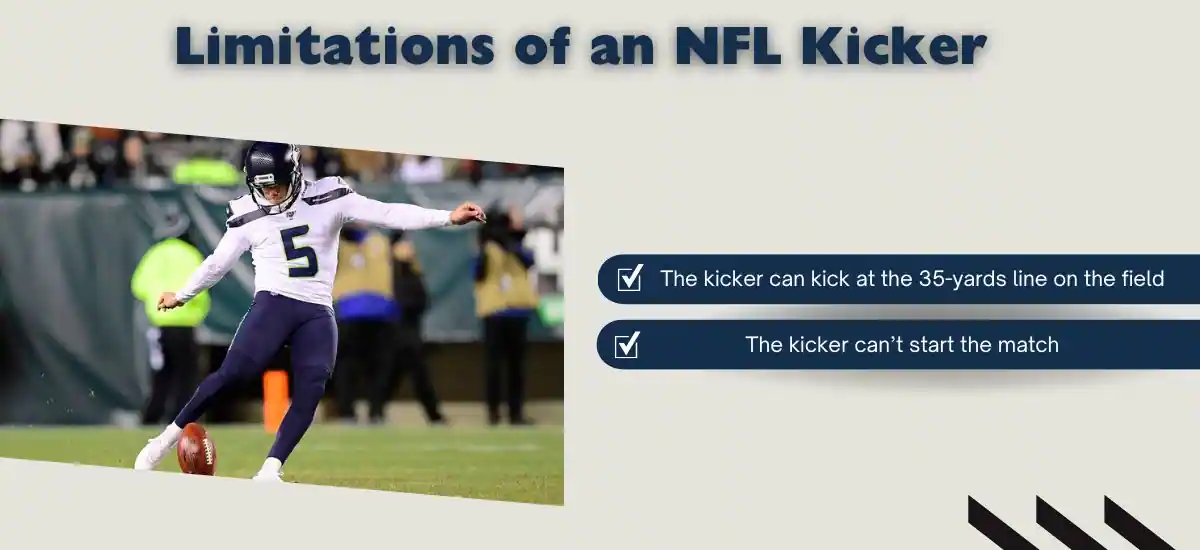Well, the salary of an NFL kicker can vary depending on their experience and skill. But on average, they get paid around 660,000 dollars- 860,000 dollars as their salary a year. On the other hand, their salaries can be varied depending on the task they are doing and the teams they belong to. You can read the below section to know more about the NFL Kickers and their average salaries.
What Does an NFL Kicker Do?

So, now you must understand that an NFL kicker stands in a prior position during the match. Being in such an important position they get paid a high amount of money. Therefore, what does an NFL kicker do during the match?
The NFL kicker is also known as a Placekicker. This role was not a specialized role in the NFL at first. However, after 1934, drop-kicking was replaced by place-kicking. Therefore, the prior task of a kicker in the NFL is to kick the field goals during the match and score extra points for the team.
As it is now considered a special role, sometimes an NFL kicker has to work as the punter or the kickoff specialist for the team he is playing. The NFL teams have to employ multiple kickers because there is a lot of chance of leg fatigue and injury for them. Generally, the NFL kickers only do their jobs in case the punter is seriously injured during the match.
However, sometimes a professional NFL team will employ a kickoff specialist. His job is to do kickoffs only. On the other hand, they are employed by the NFL team as a backup for those who do field goals and score extra points. In the history of the NFL, Justin Tucker is considered the most accurate NFL kicker so far.
NFL Kicker Average Salaries

From old age to the year 2022, the average salaries of NFL kickers solely depend on their playing skills and experience. Also, their average salary can depend on the team they are playing for. The difference between the average salaries is also clear between the star player and the average players.
NFL Kicker Salary 2022
Based on the experience, the list of the NFL kicker salary 2022 is given in the below section.
| Experience of the Players | Annual Salary of the Players |
| Less than three years | 670,000 dollars |
| More than 3 years | 906,000 dollars |
| More than 6 years | 1300,000 dollars |
The Average Kicker Salary in the NFL
Due to the covid-19 pandemic all around the world, there are some changes made when it comes to the average salary of NFL kickers. In the year 2021, the minimum average salary of an NFL kicker is 660,000 dollars. On the other hand, in the mid-season this year, this amount increased and the players received around 860,000 dollars.
The average kicker’s salary in the NFL can vary from one player to another. The star kicker will be paid a high amount of money compared to the average players. Here is the list of players according to their average annual salary in the NFL.
| Name of the Players | Their Average Salary |
| Justin Tucker | 5,000,000 dollars |
| Graham Gano | 4,666,667 dollars |
| Ka’imi Fairbairn | 4,412,500 dollars |
| Jason Sanders | 4,400,000 dollars |
| Mason Crosby | 4,300,000 dollars |
The Highest-Paid Kicker in the NFL
According to the official reports, Justin Tucker, who belongs to the team Baltimore Ravens is the highest-paid kicker in the NFL in 2021. You will be amazed to know that his base salary as a kicker is around 3.5 million dollars which is exactly the same as Josh Lambo of the team Jacksonville.
Lowest Paid NFL Kicker in the NFL
As the official reports say, Tyrone Swoopes is the lowest-paid kicker in the NFL in 2021. Unfortunately, he could only make 780,000 dollars in 2021. He played as a free agent in the match.
Experience and Limitations of an NFL Kicker
Experiences

- You should have proper football training.
- You should be on the school and college football teams.
- You should train yourself in a reputed institution
- A kicker has to kick the ball at 50 yards on the ground.
Limitations

- The kicker can kick at the 35-yard line on the field.
- The kicker can’t start the match.
- The kicker should be beyond the line, but his kicking foot can’t be beyond the line.
Related Post:

